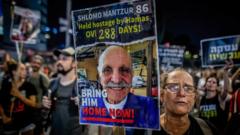Hamas has transferred what it claims are the remains of four Israeli hostages, which Israel is currently validating through DNA tests. The bodies are believed to belong to Shlomo Mansour (86), Ohad Yahalomi (50), Tsachi Idan (50), and Itzik Elgarat (69), all of whom were captured during the violent attacks on October 7, 2023.
As part of a ceasefire deal, Israel is releasing more than 600 Palestinian prisoners. Many are returning to jubilant crowds in the West Bank and Gaza, symbolizing a moment of relief amid ongoing tensions. The prisoner exchange, which is the final stage of the first part of the ceasefire agreement, is anticipated to conclude by Saturday.
Israel has yet to substantiate the DNA test results on the four bodies, which have been sent to a forensic lab in Tel Aviv after initial tests near the Gaza border. The last exchange faced complications when a Palestinian woman was mistakenly handed over instead of Israeli hostages. Hamas insisted on a discreet transfer to prevent any potential delays from Israeli authorities.
Images from late Wednesday show buses filled with newly released Palestinian prisoners arriving at a checkpoint in Ramallah, where excited family members and friends celebrated. Among those released are approximately 400 from Gaza and 50 serving life sentences in Israeli prisons. The Israeli Defense Forces (IDF) have been coordinating releases from Ofer and Ketziot prisons.
Families of the deceased hostages have expressed their grief through messages confirming the sad news about their loved ones. For instance, Tsachi Idan's family announced with sorrow the passing of their beloved family member. His abduction, along with the tragic loss of his child during the October attacks, has been a focal point of the ongoing anguish experienced by families affected by the violence.
As negotiations for the next phase of hostage releases are anticipated, the situation remains delicate, with many waiting to see if the ceasefire will extend or evolve into further negotiations. This exchange follows a period of stalled discussions between Israel and Hamas, recently resolved through mediation. On the same day, a funeral procession was held in Israel for three hostages killed while in captivity, emphasizing the continued human toll of the conflict, which has claimed numerous lives and left many families in mourning. The ongoing conflict has led to fatalities surpassing 48,000, as reported by the Hamas-run health ministry, marking a devastating chapter in the region's history.
As part of a ceasefire deal, Israel is releasing more than 600 Palestinian prisoners. Many are returning to jubilant crowds in the West Bank and Gaza, symbolizing a moment of relief amid ongoing tensions. The prisoner exchange, which is the final stage of the first part of the ceasefire agreement, is anticipated to conclude by Saturday.
Israel has yet to substantiate the DNA test results on the four bodies, which have been sent to a forensic lab in Tel Aviv after initial tests near the Gaza border. The last exchange faced complications when a Palestinian woman was mistakenly handed over instead of Israeli hostages. Hamas insisted on a discreet transfer to prevent any potential delays from Israeli authorities.
Images from late Wednesday show buses filled with newly released Palestinian prisoners arriving at a checkpoint in Ramallah, where excited family members and friends celebrated. Among those released are approximately 400 from Gaza and 50 serving life sentences in Israeli prisons. The Israeli Defense Forces (IDF) have been coordinating releases from Ofer and Ketziot prisons.
Families of the deceased hostages have expressed their grief through messages confirming the sad news about their loved ones. For instance, Tsachi Idan's family announced with sorrow the passing of their beloved family member. His abduction, along with the tragic loss of his child during the October attacks, has been a focal point of the ongoing anguish experienced by families affected by the violence.
As negotiations for the next phase of hostage releases are anticipated, the situation remains delicate, with many waiting to see if the ceasefire will extend or evolve into further negotiations. This exchange follows a period of stalled discussions between Israel and Hamas, recently resolved through mediation. On the same day, a funeral procession was held in Israel for three hostages killed while in captivity, emphasizing the continued human toll of the conflict, which has claimed numerous lives and left many families in mourning. The ongoing conflict has led to fatalities surpassing 48,000, as reported by the Hamas-run health ministry, marking a devastating chapter in the region's history.





















